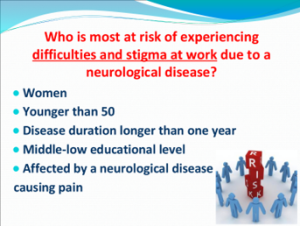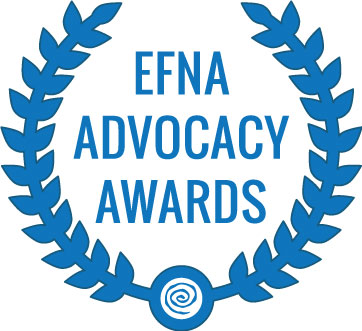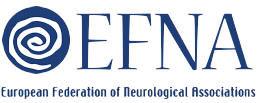February 24, 2016 from 08.30 – 10.00
Members’ Salon, European Parliament, Brussels, Belgium
An initiative of the European Federation of Neurological Associations [EFNA] & Pain Alliance Europe [PAE]
This meeting was hosted by Jeroen Lenaers MEP, who opened the event by saying that those affected by neurological and chronic pain disorders were at a ‘double disadvantage’ in terms of access to employment and education. He mentioned how the debilitating symptoms and side-effects of treatment can mean that for these patients it can be difficult to find and then remain in employment. Additionally, those who are successful then need to, not only contend with their condition, but also the stigma and social biases that it can create.
He said that even minor adjustments to the working environment can help to combat the issues raised above. He drew the audience’s attention to an amendment which he – and his fellow co-chair Marian Harkin – supported, which was put forward by the Interest Group to the Strategic Framework on Health and Safety at Work. This had been incorporated in the final draft:
It ‘draws the attention of the Commission to the increased number of workers affected by chronic illness in the workforce; takes the view that accessible and safe jobs should be available for people affected by terminal illnesses, chronic and long-term conditions and disability; urges the Member States to focus on retention and integration of people affected by chronic diseases as well as to support reasonable adaptation of workplaces, which will ensure a timely return to work; calls on the Commission to promote integration and rehabilitation measures for people with disabilities and to support Member States’ efforts by raising awareness and identifying and sharing good practices on accommodations and adjustments in the workplace; urges Eurofound to further examine and analyse the employment opportunities and the degree of employability of people with chronic diseases.’
The first speaker was Dr. Chiara Scaratti of the Besta Neurological Institute, Italy. She presented the results of a survey conducted by the European Federation of Neurological Associations [EFNA], which had almost 5000 responses from across Europe, covering a wide spectrum of brain disorders.
The analysis of these results showed that stigma in the workplace was a common problem encountered by those living with neurological disorders. It was reported that:
- Women perceive stigma more than men
- Young people experience stigma more than older workers
- The lower the educational level, the higher the stigma
- Workplace stigma increases after 1 year of illness
- Workplace stigma is higher for those who experience pain and increases with pain intensity
She summed up by saying that urgent attention was needed to address levels of stigma at work felt by the vulnerable groups mentioned above. She said: ‘Work impacts on social cohesion and on people’s quality of life. Thus, identifying first and then caring about workers with neurological disorders could benefit employers, thanks to tailored interventions. A healthier work environment can be a facilitator, and not a barrier, in helping to prevent increases in the levels of disability experienced by people affected by neurological disorders’.
The next speaker – Prof. Dr. Michiel Reneman of the University of Groningen – supported the point that work can have a therapeutic affect on patients – supporting overall physical and mental wellbeing.
He called for the European Institutions to promote Vocational Rehabilitation [VR], which he described as ‘whatever helps people to return to work or stay at work’, and said that VR:
- Is proven effective and efficient; rehab works!
- Could be supported by a very good business case
- Should be made available, alongside modified work where required, for all EU citizens with health related work participation challenges
- Public education was needed to promote this concept
- New technology should be used to assist Healthy Aging @ Work
In conclusion, he made a plea for health and employment departments at local, regional, national and European level to work together – rather that in silos.
The next two presentations were real-life experiences from the employer and employee focusing on the benefits and challenges of people affected by neurological disorders participating in the workforce.
Karin Hellsvik presented a case-study from Biogen Italy who had hired a person affected by multiple screlosis [MS] as part of an internship programme – Believe and Achieve – coordinated by the European MS Platform. She said their biggest learning was that internal HR policies can inadvertently lead to a person being ‘labelled’, and over-compensating for stigma can actually exacerbate the problem. She said it was important for the employer and employee to work together in creating a ‘safe and comfortable’ environment.
Jane Whelan, a person affected by severe migraine, spoke about the impact that her disorder had on her career progression but outlined minor workplace modifications e.g. flexible working hours, regular breaks, extra time for travel, etc. which helped to ensure she could better prevent attacks and manage them when they occured (as outlined in the amendment above). However, she said that disclosure to her boss and colleagues was necessary to ensure these adjustments were put in place and that the ‘invisible’ nature of the condition often led to scepticism, even amongst those who were aware of her diagnosis.
The final presentation was from Matthijs Groenveld, attaché to the Dutch EU Presidency. He said that employment issues were at the heart of the European political agenda, and emphasised that a socially inclusive labour market was needed if we are to have a pan-European, job-rich economic recovery. He said that the employment guidelines as part of the European Semester process could be a vehicle through which the issues raised during the meeting could be pursued. However, he said there were also many other pieces of EU legislation which would be drawn upon to ensure access to employment and education for those affected by neurological disorders and chronic pain conditions. The Dutch Presidency is currently awaiting a review of 24 Directives on Occupational Health and Safety, which will be accompanied by proposals on how this legislation can be consolidated and improved. He advised the Interest Group to follow the outcomes closely and to contribute if appropriate.
Marian Harkin, MEP co-chair, then presented a draft Written Declaration produced by the Interest Group which she said she hoped would be passed. If so, this would give patients/patient organisations across Europe another tool with which to advocate for their employment/educational rights at a national level. She said that this would be tweaked further based on the feedback from the meeting and encouraged those present to contact their national MEPs, once approved/opened, to ask them to sign. Donna Walsh, EFNA Executive Director, said that attendees would be sent some templates to allow them to reach out effectively and confirmed that if the Declaration was passed, the Interest Group would work on a toolkit to enable its implementation.
The meeting finished with a discussion – the result of which was used to reshape the Written Declaration (see appendix).
See the entire meeting report here.
DATE FOR YOUR DIARY
The next meeting is scheduled to take place on June 22nd 2016 and will focus on:
Patient Involvement in Research.











